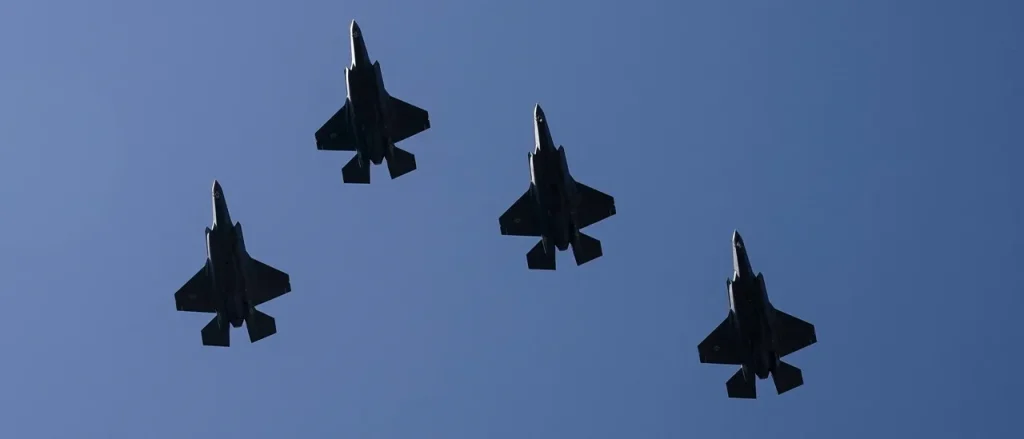The Trump administration is set to dispatch 10 F-35 fighter jets to Puerto Rico, enhancing U.S. military strength in the southern Caribbean. This move is part of a broader strategy to combat drug cartels in the area. The F-35s, known for their stealth and advanced combat capabilities, will support the existing U.S. military presence, underscoring President Trump’s resolve to curb drug trafficking.
Three days ago, Trump announced a successful strike against a cartel vessel moving drugs in the Southern Caribbean. Colombian President Gustavo Petro responded by labeling the operation as “murder,” according to a translation by the Daily Caller News Foundation. Meanwhile, U.S. Secretary of State Marco Rubio emphasized that the Trump administration is “going to wage war” on the drug cartels, indicating that additional strikes are likely.
Trump has consistently accused Venezuelan President Nicolás Maduro of being involved with the Tren de Aragua gang, which was labeled a terrorist organization in February. Despite these accusations, the Venezuelan government adamantly denies any involvement in drug trafficking. In recent weeks, the U.S. Navy has deployed several warships to the eastern Caribbean, prompting Maduro to accuse the U.S. of seeking “regime change through military threat.”
Maduro has declared Venezuela’s readiness to defend itself against what he describes as “maximum military pressure” from the U.S. He criticized the U.S. military presence as “extravagant, unjustifiable, immoral, and absolutely criminal.” The presence of U.S. forces, including 4,500 Marines and sailors, has been a point of contention, with drills being conducted in Puerto Rico, as reported by Newsweek.
The timing of the F-35 deployment coincides with a Pentagon report of a “provocative” flyover by Venezuelan planes over an American warship. Such actions have heightened tensions and underline the strained relations between the U.S. and Venezuela. This development follows the Pentagon’s ongoing focus on ensuring security and stability in the region.
The deployment of advanced fighter jets demonstrates the U.S. commitment to maintaining a strategic advantage in the Caribbean. It highlights the administration’s determination to confront and dismantle drug trafficking networks. The situation remains dynamic as the U.S. continues to assert its military capabilities in the face of regional challenges.
President Trump’s actions reflect a broader policy of taking decisive measures against threats to national security. The administration’s approach has been to project strength and deter potential adversaries. This strategy aligns with the longstanding American principle of defending its interests globally.
The situation in the Caribbean showcases the complexities of international diplomacy and military strategy. The U.S. aims to balance its efforts to combat drug cartels while addressing geopolitical tensions. The deployment of military assets like the F-35s is a testament to the ongoing commitment to safeguarding American interests.
Critics of the U.S. military presence argue that such actions could escalate tensions further. Supporters, however, view it as a necessary step in ensuring regional security and stability. The contrasting perspectives highlight the challenges faced by policymakers in navigating complex international issues.
The administration’s focus on combating drug cartels is part of a broader effort to address transnational crime. This initiative is seen as essential for protecting American communities from the influx of illegal drugs. The deployment of military resources underscores the seriousness with which the administration views these threats.
As the situation evolves, the U.S. will likely continue to employ a mix of diplomatic and military strategies. The goal is to achieve a balance between deterring adversaries and fostering regional cooperation. This approach reflects a pragmatic understanding of the multifaceted nature of global security challenges.
While tensions remain high, the administration remains steadfast in its commitment to defending U.S. interests. The deployment of F-35s is a clear signal of the resolve to confront and neutralize threats. As the situation unfolds, the world will be watching to see how these events shape the geopolitical landscape.
The strategic deployment of military assets is only one aspect of the broader U.S. policy in the region. Efforts to enhance cooperation with allies and partners are also crucial. The administration’s actions are viewed through the lens of maintaining peace and security in a volatile region.
Ultimately, the situation underscores the importance of a strong national defense. The U.S. remains vigilant in its efforts to protect its citizens and interests from external threats. As global dynamics continue to shift, the role of military power in diplomacy remains a key consideration for policymakers.
In conclusion, the deployment of F-35s to Puerto Rico exemplifies the U.S. commitment to addressing regional security challenges. The administration’s actions reflect a broader strategy of maintaining strength and stability in the face of adversity. As tensions persist, the focus remains on ensuring the safety and security of the nation.
